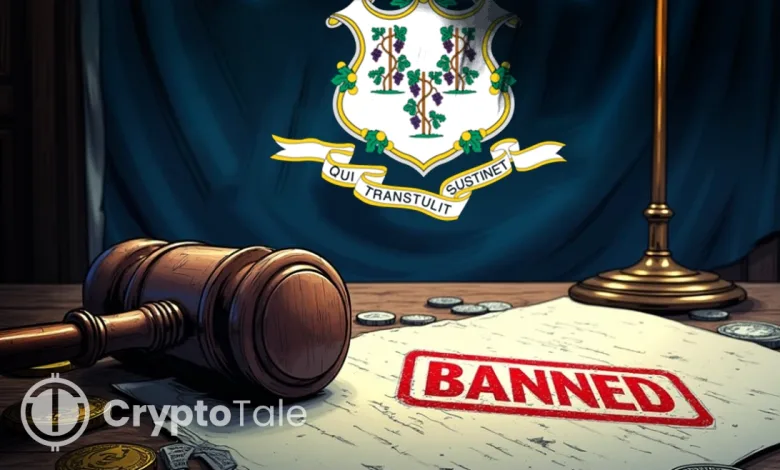Connecticut State Bans Crypto Reserves and Holdings

- Connecticut bans all state-level crypto investments and reserves under newly passed Public Act.
- The law also requires crypto firms to disclose risks clearly and maintain transparency.
- This contrasts with states like Arizona that support Bitcoin treasury reserves.
Connecticut lawmakers have taken a firm stance against digital assets, moving away from the rising trend in other U.S. states. On Tuesday, the Connecticut General Assembly passed a law that prohibits state and local governments from dealing with cryptocurrency. This includes buying, holding, investing in, or creating reserves of virtual currency.
The bill, labeled H.B. 7082, passed both the House and Senate without any opposition. It has now become Public Act No. 25-66. The law also bans any government agency from accepting cryptocurrency payments for public services or taxes.
Connecticut’s decision follows a different path compared to other states that are embracing crypto reserves. In recent months, New Hampshire and Arizona passed bills to create strategic Bitcoin reserves. Texas and other states are exploring similar plans. While other regions prepare for crypto integration, Connecticut’s new law sends a clear signal of rejection. The state’s approach focuses on caution and strict control.
The legislation H.B. 7082 also updates Connecticut’s money transmission rules, especially for crypto-related businesses. It introduces new guidelines for firms that handle virtual currency on behalf of customers. Under the law, these companies are required to provide clear and legible risk disclosures in English. These disclosures must detail the potential risks associated with handling digital assets.
Crypto businesses are also required to maintain transparency about who holds or controls a customer’s virtual currency. They cannot engage as third-party custodians without meeting the bill’s strict conditions. The law further clarifies that virtual assets held by these firms are the legal property of their users. This provision aims to protect consumers in the event that a transmission business fails or enters bankruptcy.
Another important feature of the bill includes protections for minors. The law requires platforms to verify a legal guardian for users under the age of 18. This measure follows growing concerns about youth exposure to high-risk financial tools and platforms. The rule seeks to ensure accountability for all users below the legal adult age.
Related: State Bitcoin Bills in Florida Officially Dropped Without Vote
Connecticut’s crypto restrictions place it outside the group of states building digital asset reserves. While others view Bitcoin as a strategic hedge, Connecticut lawmakers have opted for caution.
Public Act No. 25-66 is now in effect and establishes a new standard for cryptocurrency governance in state finance. Connecticut will not join the crypto reserve movement, at least for now.




